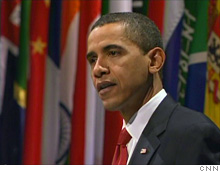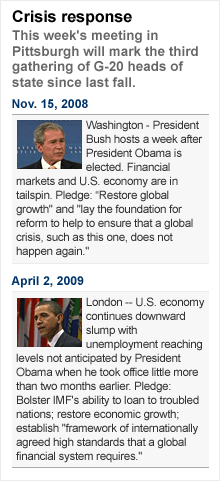G-20: Do global summits matter?
Leaders of the world's biggest economies converge again. They will call for strengthening the financial system that collapsed - just like they did twice before.
 |
| President Obama addressed the last G-20 meeting of world leaders in April. |

WASHINGTON (CNNMoney.com) -- Let's try this again.
When Group of 20 leaders meet in Pittsburgh this week, they will call for a coordinated global effort to tighten financial regulation to prevent future financial collapse.
That sounds a lot like the same thing they said at the previous two meetings they convened over the past year in April and last November.
"We'll discuss some of the steps that are required to safeguard our global financial system and close gaps in regulation around the world -- gaps that permitted the kinds of reckless risk-taking and irresponsibility that led to the crisis," President Obama said last week.
Leaders will probably walk away from the Pittsburgh summit with a general agreement on at least two priorities: Requiring banks to build stronger safety nets for their balance sheets and getting tougher on executive pay in order to curb risky practices. They may even set some deadlines -- as in next year or several years from now.
"There's little more you can expect from a meeting like this," said Benn Steill, director of International Economics at the Council of Foreign Relations. "Even I'd be a little uncomfortable with them trying to do more, because we're a ways away from a consensus domestically on what the numbers should be."
A White House senior adviser, speaking to reporters last week, defended G-20 progress on global regulatory reforms. For one thing, nations have been focused on the more immediate task of stabilizing their economies.
"If you asked people then what they thought the situation would be in September, they probably thought it would be worse than it is now," said Michael Froman, deputy national security adviser for international economic affairs.
Froman also stressed that just getting all the nations to agree on regulatory reform principles is an accomplishment.
"We should not necessarily underestimate what the significance of countries coming together and saying, 'Given the lessons of this crisis, here are the policies we agree to pursue going forward, some of which require adjustment in our approach to our economic policy,' " Froman said. "That's a fairly significant innovation in international cooperation."
However, some European officials are worried about what they see as a lack of progress.
A group of regulators and academics called the European Shadow Financial Regulatory Committee sent the G-20 a letter this week warning that proposals on the table "are not likely to substantially reduce the likelihood of future crises."
"We are concerned that not enough has been done," said Harald Benink, a banking professor at Tilburg University in the Netherlands who chairs the group.
Earlier this month, U.S. Treasury Secretary Tim Geithner lobbied G-20 finance ministers to endorse a key reform effort: Requiring bigger capital cushions at financial firms. Such reserves can protect banks against losses and are considered important for preventing another financial crisis.
The idea is among those at the top of the list for the Pittsburgh meeting.
While nations agree about the need for boosting reserves, the debate will likely center around how best to do it. The more controversial question of how big capital reserves should be is not expected to be decided.
The United States would prefer to pass its own capital rules and have other countries follow suit, said Eswar Prasad, an international economist at Cornell University. The Europeans would prefer a multi-national process with all nations work together, more or less, as equals.
"The Europeans want to be very involved in developing those standards, so they're not going to be as enthusiastic as they might be," Prasad said.
The more high-profile regulatory proposal will be over executive pay -- and how to tackle it.
The French, among others, have been calling for global caps on executive pay, but the Obama administration isn't budging on that issue.
"I think the president has been pretty clear that he supports a robust approach to executive compensation, but has been reluctant to sort of set individual compensation levels," Froman said.
International experts say they don't expect the G-20 to endorse pay caps. Instead, the leaders are likely to give a nod to a set of principles that would encourage countries to decouple bonuses from risky behavior, while adding more disclosure of pay to regulators or shareholders.
Morris Goldstein of the Peterson Institute for International Economics said that the G-20 could create a compromise that satisfies all members by linking executive pay issues to stronger capital requirements. If financial firms are forced to increase capital requirements, it means they'll have fewer profits, and less available for bonuses linked to profits.
Experts also say that the G-20 will also talk about the need for coordinated regulation of some of the kinds of complex financial products that were sold by Lehman Brothers and AIG (AIG, Fortune 500). However, the countries are not likely to reach agreement on how to do it.
Finally, experts believe the Pittsburgh meeting will feature discussion of broad, tricky issues of rebalancing different G-20 member economies.
The United States wants China to spend more and depend less on exports, and other nations want the United States to quit living on debt. But the meeting is not expected to produce a concrete plan for rejiggering the imbalances. ![]()



